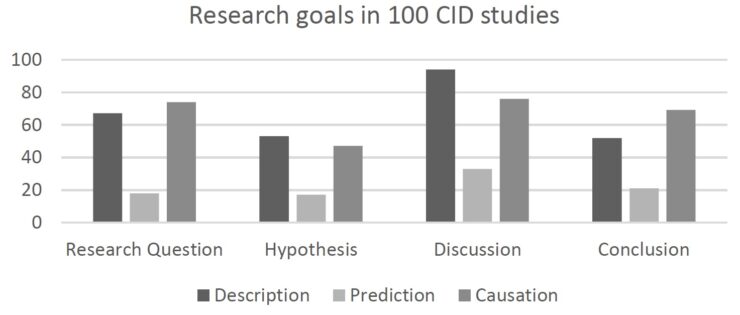News
Description, prediction and causation: Methodological challenges of studying child and adolescent development
The goal of the Consortium on Individual Development (CID) is to study the development of social competence and behavioural control, as these are two skills that are essential to function in society and to reduce the risk of behavioural and emotional problems. CID takes an interdisciplinary approach towards this goal, with research ranging from eye-tracking tasks in infants and babies to self-reports through the use of mobile phones in adolescents, from parenting interventions based on video feedback to birds learning new songs, and from intergenerational transmission of pup retrieval in rodents to the transmission of harsh parenting to next generations in humans. We adopted a methodological lens through which to evaluate these efforts, and focused on the research goal of a study. Since different research goals require different research methods in terms of design, operationalization, model building and evaluation, it should form an important basis for decisions on how to set up and execute a study.
100 CID studies
We were curious to find out to what extent CID research could be classified as: a) descriptive research, with the goal to summarize characteristics of a group (or person); b) predictive research, with the goal to forecast future outcomes, which can then be used for screening, selection, or monitoring; or c) causal research, with the goal to gain insight in the underlying mechanism, which can then be used to develop interventions. Especially the latter research goal is not always stated clearly, as researchers avoid the use of explicit causal language when they are not using an experimental design. We were therefore also interested in whether a cross-sectional, longitudinal, or experimental design was used.

Fig. 1. Number of papers in a random sample of 100 CID studies that indicate a descriptive/association, predictive/forecasting, or explanation/causal interest in the research question, hypotheses, discussion, and conclusion. Note that a study may include multiple goals.
We selected a random sample of 100 CID studies and found that most of the studies within CID were driven by descriptive (67%) and causal (74%) interests. Moreover, when combining the goal with the design, we found that the majority of studies with a causal goal were based on non-experimental research, and that even if an experiment was performed, some of the causal research questions were not concerned with an experimentally manipulated aspect in the study. For instance, the research question may have been about the causal relation between two outcome variables (e.g., brain activity and behaviour), neither of which was manipulated directly by the researchers, or the question may have been about the causal effect of personality, measured prior to the experiment, on the effectiveness of the manipulation within the experiment.
Enriching the methodological toolbox
There are several important methodological developments that are not yet part of our curricula, but that could prove extremely valuable to developmental scientists. We briefly introduced what we believe to be the most promising techniques for descriptive, predictive and causal research. These include machine learning techniques such as unsupervised and supervised learning for descriptive and predictive purposes respectively, with a focus on the importance of out-of-sample performance through the use of cross-validation. In addition, we discussed diverse ways in which research into causality can be enhanced, especially when a randomized controlled trial is practically and/or ethically unfeasible (e.g., when we are interested in social-economic conditions on children’s behaviour, or the effect of cyber-bullying on adolescent self-esteem). These alternative methods include: directed acyclical graphs, which helps to determine which possible confounders we need to control for in our design or analysis, and, more surprisingly maybe, which variables we should actually not control for; Mendelian randomization, a specific form of instrumental variables based on genetic parent-offspring data; and the target trial, which is based on a well-defined thought experiment that helps to clearly formulate the actual causal question one tries to tackle.
More information
Ellen L. Hamaker, Jeroen D. Mulder, Marinus H. van IJzendoorn (2020) Description, prediction and causation: Methodological challenges of studying child and adolescent development Developmental cognitive neuroscience DOI: 10.1016/j.dcn.2020.100867
This paper is part of a special issue in Developmental cognitive neuroscience about the Consortium on Individual Development. For an overview of all papers go to here
